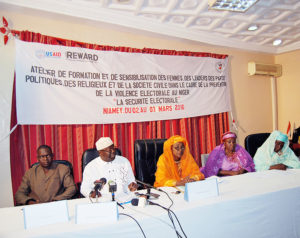Women in Niger declare candidacy in local elections
By Jillian SlutzkerJuly 20, 2016
When citizens in Niger’s Tahoua and Dosso regions head to the polls in January 2017, they will find something new on their ballots—the names of several female candidates.
Djermakoye Maimouna, a resident of Dosso, will be one of these candidates.
“I am going to [run] in the coming local elections,” she says proudly. “Men have dominated all the leadership positions in Niger for [too] long, leaving us only as child bearers.”
Despite a national 15 percent quota for female members of parliament, women have been gravely underrepresented in elected office at the local level. Traditional gender norms about the roles of women, coupled with limited knowledge about their own political rights and responsibilities, have kept women like Maimouna from participating in political processes in the past.
But Maimouna and other women across Niger’s eight regions are now standing up to declare their candidacy for local elections, thanks to a series of workshops designed to strengthen the capacities of women leaders to play an active role in the political process.
The trainings were supported by the USAID Reacting to Early Warning and Response Data in West Africa project, implemented by Creative Associates International.

The workshops, which were carried out by the women’s umbrella organization Coordination des Organisations Non-Gouvernementales Féminines Nigériennes (CONGAFEN) also targeted women leaders, opinion influencers, religious heads and youth with training on how to promote inclusion and mitigate potential electoral violence in upcoming elections. The workshops trained 805 people in total, including 416 women.
“The inclusion of women and other marginalized groups in elections offers them a forum to have a voice in how they are governed,” says Jeffrey Carlson, Director of Electoral Education and Integrity at Creative. “Such inclusion can lead to greater participation in more peaceful political processes as frustration among these underrepresented and disenfranchised sectors of the population is reduced.”
As she prepares for her impending electoral race, Maimouna says she owes her “new spirit” to the empowering trainings provided by the project.
In the neighboring Tahoua region, Abani Aichatou is another new female candidate for the January local elections and another powerful advocate for women playing an equal and active role in the political system.
“We the women have been fooled for a long time,” she says. “Through the training, I have realized that women can become candidates too. I will surely [run for office] during the coming local elections in Tahoua.”
With reporting by Fatima Moussa Kako, President of Coordination des Organisations Non-Gouvernementales Féminines Nigériennes (CONGAFEN)

